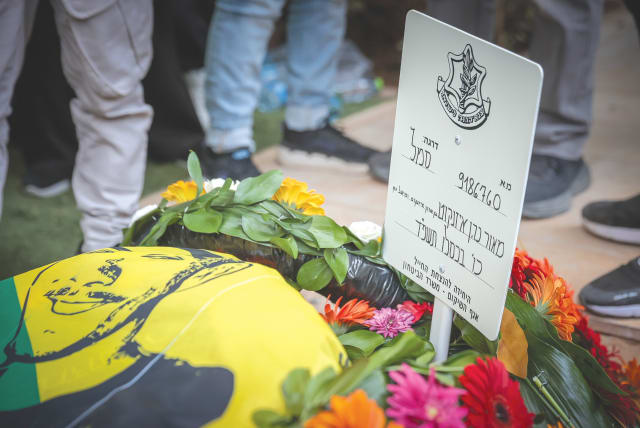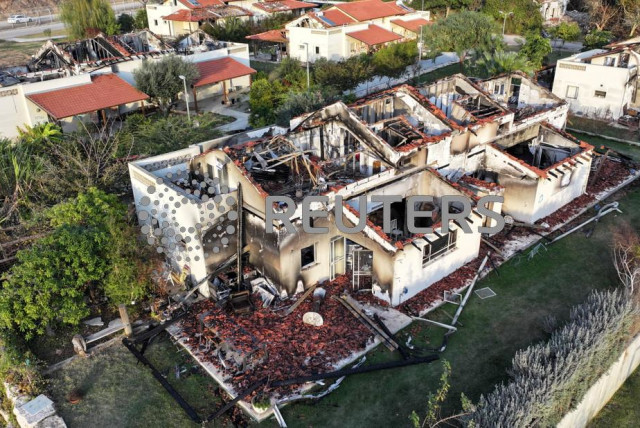Issue of posthumous procreation within the context of the Gaza war - opinion

Israel, still stricken by October 7, deals with a sensitive social parenting issue: The ability to take sperm from the deceased and bring into the world a child in parenthood after death.
‘I want to be a grandmother to a grandson from Maor. The end must be good,” Sharon Eisenkot, who lost her son Maor Cohen Eisenkot in battle in the Gaza Strip, recently told Channel 12 News. Sharon, sister of Minister-without-portfolio Gadi Eisenkot, is just one of many in Israel who wish to become parents and grandparents to a child who will come into the world using the sperm of their fallen loved one.
And now, the bereaved and life-seeking State of Israel, still stricken with astonishment by the tragic events of October 7 and the Swords of Iron war that followed, has returned to deal with one of the most sensitive and painful social-parenting issues: The ability to take sperm from the deceased and bring into the world a child in parenthood after death.
Posthumous parenting brings up many ethical, social, and psychological issues. There is an impossible mixture of values – some are contradictory, some are complementary. There is grief and joy, despair and hope, death and the life that follows, and the Jewish ethos for fertility and continuity. One of the main arguments against the use of sperm from the dead is the fear of “birth orphanage,” according to which the child who is born is in fact a memorial.
To date, Israeli law has not regulated this complex issue, while processes of sperm retrieval are regulated by the family courts and by the attorney-general’s guidelines published in 2003.
Prior and after October 7
Prior to October 7, a request to extract sperm from the deceased required the approval of the Family Court. Since the window of opportunity for medical sperm retrieval is limited (between 24 and 72 hours from the time of death), the initial application submitted by family members immediately after death is approved in the sense that the sperm is extracted, and only then does the court begin to discuss the question of whether to allow, and whom to allow, the use of the sperm.
Four days after the events of October 7, due to the state of fighting and the large number of fatalities, a temporary order was issued that includes a new legal directive by the attorney-general according to which hospitals will be able to take sperm from a deceased person, not only at the request of the spouse but also at the request of his parents. Still, anyone who wishes to later use the sperm to bring a child into the world will have to apply for permission from the court.
In November 2023, the Knesset also resumed deliberations on a Continuity Law, which was submitted in the past but was not advanced until the current war. The bill, if approved, will allow the use of a late IDF soldier’s sperm at the request of his spouse, and under certain conditions also at the request of his parents.
The bill also includes provisions for regulating the issue, allowing soldiers to give their opinion on the issue and to leave instructions on whether they wish to permit (or prohibit) the use of sperm in the event of death.
The proposal also regulates the status of the child to be born, where the name of the deceased will be written as the parent on the birth certificate, and the status of the parents of the deceased as the grandparents of the child. It is interesting to note that the bill denies the child’s entitlement to compensation to the families of soldiers who were lost in battle – even though until now a number of children born in such a situation were entitled to these benefits. In practice, since the beginning of the fighting, the IDF has offered this option to families, with the procedure referred to as “sperm utilization.”
The procedure already has been carried out dozens of times since the beginning of the fighting. Since October 7, many proceedings have been filed with the courts to make use of the sperm, and the courts will have to deal with the consequences and decide on these cases.
This is how the court decides if a child will be born to a soldier who has fallen:
The judicial examination in these cases considers two questions: Firstly, whether the court is convinced with certainty that the deceased wanted children after his death. A statement of a spouse left by the deceased, that this was his wish, will satisfy the courts.
Secondly, if the deceased did not leave behind a spouse, conclusive proof will be required whether the deceased wanted to have children during his lifetime, but also if he wanted children to be born to him after his death, and grow up in his absence. This means that if the deceased had a spouse, the other family members – including the deceased’s parents – do not have the right to act to have children from the deceased’s sperm after his death.
This outline, created by the courts from case to case, is consistent with the guidelines of the attorney-general, which were drafted in 2003.
The first cases heard by the courts were usually filed by the man’s widow, who asked to use his sperm. Later, the parents of the deceased – the future grandparents – also requested that grandchildren be born to them from their son’s sperm with a woman who usually did not know the deceased.
Alliances were formed. As part of this cooperation, the parents provided continuity for their late son’s sperm: the woman received a sperm donation and a supportive extended family, who also helped financially.
In 2016, the Supreme Court heard a case in which a dispute arose between the parents of a deceased man, who asked that his sperm be used to conceive a grandchild, and his widow, who objected. In accordance with the rulings mentioned earlier, the court ruled that under these circumstances, the parents have no standing against the wife.
In a 2019 case, the Supreme Court ruled that in the absence of an explicit expression by the deceased that he wanted children and would like to have a child even after his death, only the spouse is entitled to use the sperm after the death of her partner.
There is no doubt that the events of the Swords of Iron War raised the issue of posthumous procreation on the public agenda. It is hoped that this will lead to a clear statement by the legislature on this sensitive and painful issue. However, until the issue is settled by the legislature, the practical solution is to sign a biological will in the presence of a lawyer, in which the testator can express his wishes and leave instructions regarding who can make use of his genetic material.
Nothing can cure the unimaginable grief of the bereaved families, but the comfort is in knowing that the wishes of the deceased have been fulfilled and that the creation of a new life may lead, as Sharon Eisenkot put it, to a happy ending.
The writer is an expert in family and inheritance law, and a lecturer of family law at the School of Law, College of Management.
Jerusalem Post Store
`; document.getElementById("linkPremium").innerHTML = cont; var divWithLink = document.getElementById("premium-link"); if (divWithLink !== null && divWithLink !== 'undefined') { divWithLink.style.border = "solid 1px #cb0f3e"; divWithLink.style.textAlign = "center"; divWithLink.style.marginBottom = "15px"; divWithLink.style.marginTop = "15px"; divWithLink.style.width = "100%"; divWithLink.style.backgroundColor = "#122952"; divWithLink.style.color = "#ffffff"; divWithLink.style.lineHeight = "1.5"; } } (function (v, i) { });

